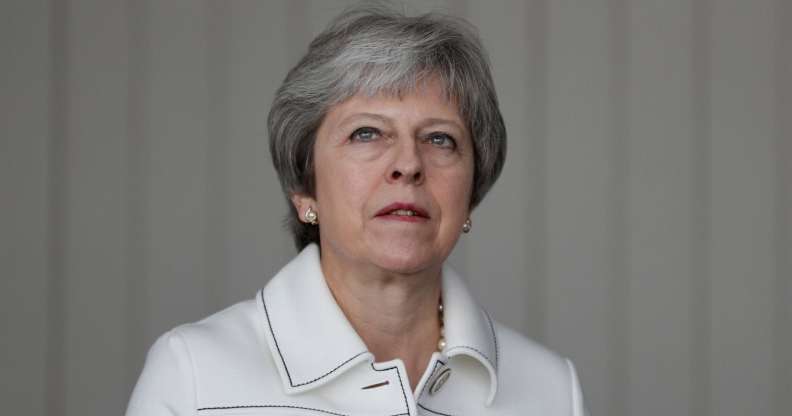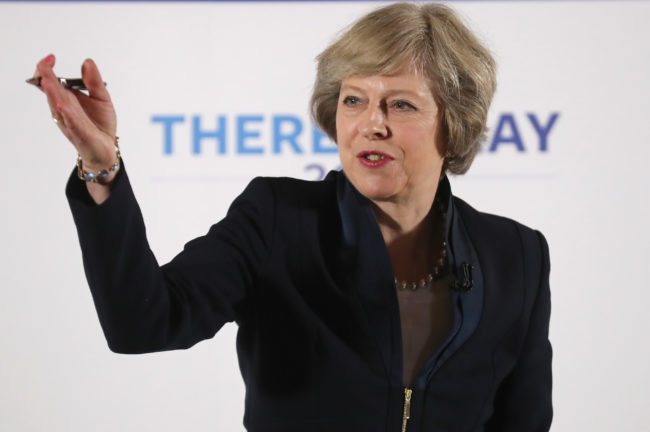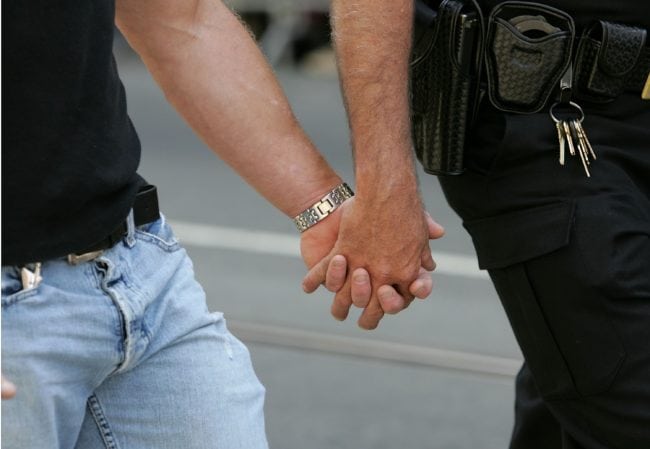Theresa May says she ‘shouldn’t have’ voted against the repeal of Section 28

Prime minister Theresa May has said she “shouldn’t have” voted against repealing Section 28 in 2000. (Darren Staples – WPA Pool/Getty)
Prime minister Theresa May has admitted she “shouldn’t have” voted against the repeal of the controversial Section 28 in 2002.
Speaking at to ITV’s Paul Brand at the Downing Street LGBT reception – following the launch of the government’s LGBT action plan on Tuesday – May also said that gay conversion therapy was an “abhorrent practice.”
“There’s some things I’ve voted for in the past that I shouldn’t have done and I’ve said sorry. Section 28 obviously would have been one of those things,” she said.
“I hope people can see that the UK has actually changed and Government should be proud of the actions it’s taken. There’s more to do.”
May added: “I hope people will see the fact I recognise that I shouldn’t have taken that view on Section 28. I have developed my views. I want to be seen as an ally of the LGBT community here in the UK.”
The prime minister has previously been criticised for her voting record on LGBT rights, having also voted against gay adoption in 2002. She did, however, vote in favour of same-sex marriage in 2013.

May also described gay conversion therapy as an “abhorrent practice.” (Christopher Furlong/Getty)
Section 28, which banned schools and councils from “promoting” homosexuality, was finally repealed across the whole of the UK in November 2003.
The prime minister went on to discuss the government’s pledge to outlaw gay ‘cure’ therapy in its new LGBT action plan, saying she was “shocked” to find out it is still used in this country.
The action plan was published following the results of the government’s national LGBT survey, which had more than 100,000 respondents.
The research found that seven percent of LGBT people had been offered or undergone gay ‘cure’ therapy, and that more than two-thirds (68 percent) of people avoided holding hands with a same-sex partner in public for fear of a negative reaction.

The national LGBT survey revealed that more than two-thirds (68 percent) of people avoided holding hands with a same-sex partner in public for fear of a negative reaction.(Justin Sullivan/Getty Images)
May said conversion therapy has “no place in modern Britain,” adding: “We are determined as a Government to end it. We are going to consult on the best way of doing that and we’re very clear that this is something that does not have a place in our society.”
She continued: “We will be consulting on the best approach we should be taking.”
May also talked about the government’s proposed reform of the 2004 Gender Recognition Act. Equalities minister Penny Mordaunt launched the consultation into the review on Tuesday.
Asked whether she was concerned about trans rights infringing on women’s rights, she responded: “No – but I recognise the concerns.
“For those who are worried about it, we will listen to them when we take this forward – this is why we will be consulting widely on this.”
The government has said it wants to de-medicalise the process to legally change genders, moving towards self-identification, which is used in other countries like the Republic of Ireland.

